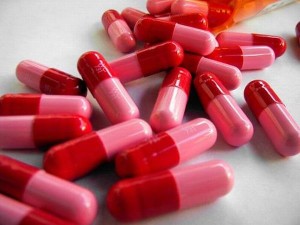 If you have an allergy to penicillin, your immune system overreacts to the drug. If you are truly allergic to penicillin you may have to avoid derivatives of penicillin also, such as amoxicillin, ampicillin, cephalosporin, and Keflex. If you are allergic to penicillin, you are most likely allergic to the beta-lactam molecule in penicillin. Amoxicillin does not contain beta-lactam, but contains a different molecule. Someone allergic to penicillin might not be allergic to amoxicillin. Most people find out they are allergic to penicillin when they have an adverse reaction of some kind. For instance, your first time taking penicillin may be uneventful. The next time you take penicillin you might break out into a red, itchy rash. If you ever have a reaction to penicillin, you should report it to your doctor and pharmacist. You should not take penicillin again, because an allergic response to penicillin could be worse the next time. Many people become more sensitive to an allergen the more they are exposed to it.
If you have an allergy to penicillin, your immune system overreacts to the drug. If you are truly allergic to penicillin you may have to avoid derivatives of penicillin also, such as amoxicillin, ampicillin, cephalosporin, and Keflex. If you are allergic to penicillin, you are most likely allergic to the beta-lactam molecule in penicillin. Amoxicillin does not contain beta-lactam, but contains a different molecule. Someone allergic to penicillin might not be allergic to amoxicillin. Most people find out they are allergic to penicillin when they have an adverse reaction of some kind. For instance, your first time taking penicillin may be uneventful. The next time you take penicillin you might break out into a red, itchy rash. If you ever have a reaction to penicillin, you should report it to your doctor and pharmacist. You should not take penicillin again, because an allergic response to penicillin could be worse the next time. Many people become more sensitive to an allergen the more they are exposed to it.
Penicillin allergy is the most common of all drug allergies. Many children are sensitive to penicillin from an early age. Other people could develop an allergy later in childhood or adulthood. A severe allergy to penicillin could result in skin rash, hives, nausea, vomiting, diarrhea, dizziness, wheezing, and difficulty in breathing. If you or a loved one has slurred speech, confusion, difficulty in breathing, or you see a bluish color to the skin, nail beds, or skin, get emergency help immediately.
 Many people believe they are allergic to penicillin, when they may not have a true allergy to the drug. If you have some gastrointestinal upset while taking penicillin, that is quite normal. Many people have loose stools, from gastrointestinal intolerance, when they take antibiotics. Gastrointestinal intolerance isn’t an allergy to penicillin; it is a side effect of the medication. Some people taking antibiotics will experience side effects, and others won’t.
Many people believe they are allergic to penicillin, when they may not have a true allergy to the drug. If you have some gastrointestinal upset while taking penicillin, that is quite normal. Many people have loose stools, from gastrointestinal intolerance, when they take antibiotics. Gastrointestinal intolerance isn’t an allergy to penicillin; it is a side effect of the medication. Some people taking antibiotics will experience side effects, and others won’t.
Another side effect that may be confused for an allergy to penicillin is that a person might develop a yeast infection when taking penicillin and other antibiotics. This side effect is quite normal also, because antibiotics can upset the balance between beneficial bacteria and yeast. If the beneficial bacteria are diminished, the yeast will flourish. A good way to prevent a yeast infection while taking penicillin and other antibiotics is to drink buttermilk, or eat yogurts and other foods with live cultures.
 True allergies to penicillin occur in fewer than 10 percent of people taking this antibiotic. Anaphylaxis occurs in less than 1 percent of the people who have taken the drug. Penicillin allergies are fairly common in babies. You may have been allergic to penicillin from the time when you were a baby. You might not even know what type of allergic reaction you had as a baby, if no one told you. A doctor might ask you what kind of allergic response you had when you were given penicillin. You might not know the answer to that question if you were never told. Your doctor, can give you other drugs that are not derivatives of penicillin. There is no need for a doctor to become complacent about your allergy, and second guess what your reaction to penicillin might be. Therefore, there is no need to “try you out” on a prescription of penicillin to see if you can tolerate it. If you have a history of being allergic to penicillin (even if you don’t know what your symptoms were) you should not ever take penicillin.
True allergies to penicillin occur in fewer than 10 percent of people taking this antibiotic. Anaphylaxis occurs in less than 1 percent of the people who have taken the drug. Penicillin allergies are fairly common in babies. You may have been allergic to penicillin from the time when you were a baby. You might not even know what type of allergic reaction you had as a baby, if no one told you. A doctor might ask you what kind of allergic response you had when you were given penicillin. You might not know the answer to that question if you were never told. Your doctor, can give you other drugs that are not derivatives of penicillin. There is no need for a doctor to become complacent about your allergy, and second guess what your reaction to penicillin might be. Therefore, there is no need to “try you out” on a prescription of penicillin to see if you can tolerate it. If you have a history of being allergic to penicillin (even if you don’t know what your symptoms were) you should not ever take penicillin.
Other antibiotics that are just as effective as penicillin are Cipro, Levaquin, tetracycline, erythromycin, Zithromax and others. Most of the infections that could be treated with penicillin and penicillin derivatives could be treated with one of these mentioned antibiotics. Antibiotics have been so overused in the past that the body can become over sensitized to it, or the organisms making you sick can become resistant to them.
Related Articles
